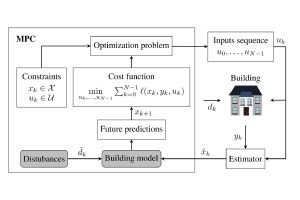
The Department of Civil and Systems Engineering (CaSE) is expanding its curriculum with the addition of a new course titled Introduction to Machine Learning and Control for Building Energy Systems. Taught by Associate Professor Ján Drgoňa, the course integrates cutting-edge machine learning techniques to address energy efficiency challenges of HVAC systems in modern buildings.
“In building optimization, we integrate AI to make buildings sustainable through more efficient energy use while reducing the time to design building control systems,” Drgoňa said. “Designing control systems in buildings is still primarily manual and most buildings are not yet ‘smart’—meaning they cannot optimize based on changing energy needs and considerations like the type of energy used, energy price, forecasted weather, building structure and orientation, occupancy, and time of year.”
The new course will introduce HVAC system identification, machine learning, and optimal control for energy-efficient building management. The course consists of a weekly lecture followed by hands-on coding assignments to put theoretical concepts into practice.
Designed to train the next generation of engineers, the course incorporates a novel class of methods called scientific machine learning, SciML for short, which combines AI and traditional physics-based methods to model complex systems. By applying SciML, students will learn how to make buildings more sustainable through efficient energy usage and faster design processes for building control systems.
The course is rooted in Drgoňa’s innovative research on SciML for dynamic systems, optimization, and control, as well as his real-world experience deploying advanced control methods for building energy systems and industrial process control.
The course is open to both undergraduate and graduate students interested in using SciML to model energy systems. Prerequisites include differential calculus, linear algebra, and optimization.